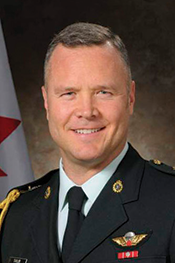 Colonel James C. Taylor
Colonel James C. Taylor
The Dental Corps of the Canadian Armed Forces (CAF) owes its very creation to the Canadian Dental Association (CDA) and, like the rest of Canadian dentistry, we continue to look to CDA’s leadership and stewardship of the profession in Canada. We have the challenge of functioning concurrently as both a military organization and as Canada’s largest dental clinical group practice, while ensuring that we remain, as so nicely stated recently by the CDA president, “an integral part of the fabric of professional dentistry in Canada.”1 This latter characteristic is very important to us, and to the Government of Canada (GoC), which wants to ensure that Canada’s sons and daughters, when serving their country as soldiers, sailors and air personnel, are receiving the prevailing Canadian standard of care at their places of duty both in Canada and around the world.
Beyond ensuring the oral health fitness and rehabilitation of CAF soldiers at home and abroad, both on land and at sea, the Dental Corps provides domestic outreach care, international humanitarian care, international capacity building in the realm of oral health care, and forensic odontology support when called upon by the GoC. Developing and sustaining this breadth of capability in a relatively small organization requires the ongoing collaboration of a number of Canadian dental institutions.
Our standing forensic odontology capability has been greatly indebted, since its inception, to Dr. David Sweet and the training provided by his team of experienced forensic practitioners at the Bureau of Legal Dentistry at UBC. Canada’s dental deans educate our DDS and DMD graduates (and many specialty postgraduates), while a number of Canadian colleges educate our dental assisting and dental hygiene professionals. The National Dental Examining Board, the Royal College of Dentists of Canada, the American Board of General Dentistry, the National Dental Assisting Examining Board and the National Dental Hygiene Certification Board examine our clinicians upon completion of their respective clinical education programs.
Canada’s provincial and territorial dental regulatory authorities license our professionals, and provide us 13 expert lenses by which we can objectively assess our Dental Corps as a clinical institution. We are currently working with the Commission on Dental Accreditation of Canada and the Royal College of Dental Surgeons of Ontario to explore pathways to accreditation for our unique and widespread institution. And our relationship with Dr. Peter Cooney and his Office of the Chief Dental Officer of Canada (OCDOC) at Health Canada provides our touchstone for GoC policy in the realm of dentistry.
A recent development is our relationship with JCDA and the Canadian Agency for Drugs and Technologies in Health, participating in knowledge translation for Canadian dentistry to be disseminated through JCDA Clinical Q&A and jcda.ca. And of course our partnership with CDA, as discussed by the CDA president in his last column, with collaboration by the OCDOC and the Canadian International Development Agency, to sustainably develop the oral health capacity of the Afghan National Army, and for the people of Afghanistan through the newfound Afghanistan Dental Association.
A CDA president once described the Dental Corps of the CAF as having “always been a stalwart pole in the CDA tent.” We shall continue to strive to deserve that honour from the organization that has given the Dental Corps in particular, and Canadian dentistry in general, so much for over a century.
Reference
- Sutherland, R. CDA and the Canadian Forces: an Enduring Connection. J Can Dent Assoc. 2013;79:d21
